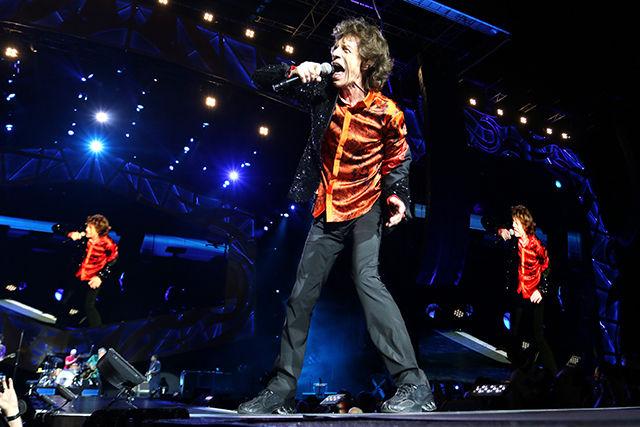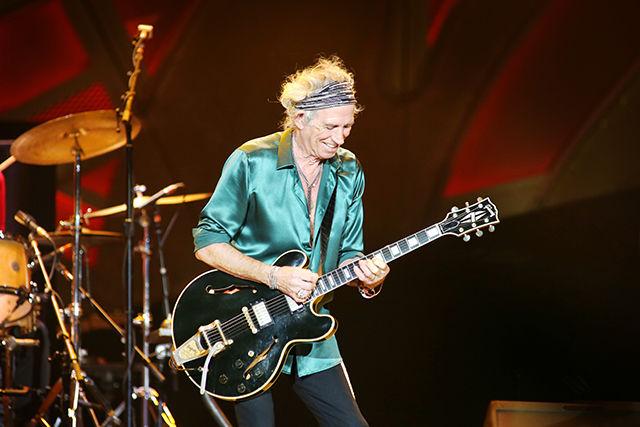The Rolling Stones played to a crowd of more than 40,000 fans, young and old, at Carter-Finley Stadium Wednesday night, for one of the last stops on their ZIP Code tour which began in February of last year.
Fans came out to be reminded where we (and our music) came from. Shockwaves of youth ran through the crowd full of old bodies rocking band memorabilia dating back to the hay-day of the 1970s as Mick, Keith, Charlie, Ronnie and their supporting cast played fan favorites like “Tumbling Dice” and “Gimme Shelter.”
The joke, “I can’t believe they’re not dead yet,” was told too many times by impatient crowd members trying to lighten the mood of those around them. At an average of 71 years old, the band’s age seemed to go in reverse when the lights came on.
The Stones were dressed in black sequin blazers, flamboyant primary-colored T-shirts (including a billowing red fur coat donned by Mick Jagger while performing Sympathy for the Devil) and modern Adidas tennis shoes; the band’s clothing matched their energy on stage.
“Wooh!” (it sounded exactly like it reads) shouted a drunken fan during a brief moment of quiet.
Wednesday’s show was The Stones’ first time in the Triangle in nearly a decade — the band made an appearance at Duke University in 2005. This was the fourth time The Stones have played in Raleigh. They previously played at Reynolds Coliseum in 1965, then at Carter-Finley in 1989 and 1994.
“Anyone here that supports the Wolfpack? The Tarheels? Blue Devils?” Jagger asked playing to the crowd between songs. “It’s great to see you in the same stadium at the same time.”
The show has grown since their first appearance in Raleigh — the size of the audience, the size of the venue and the age of the band members. In 1965, the average age of the Stones was 22. They performed in front of an audience of about 14,000 people consisting of mostly high school and college students, according to the Technician’s coverage of the show in 1965.
Fifty years later, the band rocked out at a nearly sold-out venue, this time the audience consisted of mostly older fans.
Harold Rousso, a Charlotte native, has seen The Rolling Stones every time they have come to North Carolina, and said the only difference he notices is the way tickets are bought.
“Back in the ’70s it was first come first serve, it was a mad house!” Rousso said with an old grin. Because of the stamina of the band and the commitment of the fans, Rousso said that there hasn’t been much change in the relationship between the crowd and performers.
“The crowd hasn’t changed much since the beginning, and they’re all suckers!” Rousso said of fans, including himself, who can’t seem to be “satisfied” with seeing The Rolling Stones live. “It’s the same show every time but it’s a good show.”
Rousso said he remains in awe of the aging rockers.
“I don’t know how he does it,” Rousso said speaking of Jagger, who to him is the star of the show. “He gives me inspiration.”
Rousso said that he raised his kids based on the song “You Can’t Always Get What You Want,” which The Stones played Wednesday night.
The Avett Brothers, an indie-blue grass band from Concord, North Carolina, opened the show. They played a set of six songs, yet Carter-Finley was still fairly empty during their performance.
Duke University’s gospel choir, Vespers, were back-up singers for the Rolling Stones, adding a soulful vibe to the concert.
Tailgating for the concert began at 4 p.m., but the traffic started hours before. Police on horseback, emergency vehicles and helicopters flying above were all eager and prepared for the thousands of attendees.
The iconic red-tongue graphic was sported in a myriad of ways around Carter-Finley, especially on printed tees. Ranging from camouflage, to tie-die, to throwbacks from previous tours, there was no shortage of them.
If fans didn’t already own a T-shirt, vendors were readily available at nearly every corner to sell one for a steep $30. Dozens of people waited in lines for merchandise, even during the performance.
The main crime police dealt with at the concert was the illegal sale of merchandise, according to University Police. Other prevalent crimes included public intoxication, underage drinking and attempts to steal souvenirs.
No alcohol was allowed inside Carter-Finley due to NC State’s policies. However, it did not stop concert-goers from drinking beforehand.
“Look around at all the alcohol,” said Stephanie Monk, a 2015 NC State alumnus. “Raleigh is a happenin’ town, nothing will slow us down.”
Tickets for the event ranged between $75 and $800 for field level seats. It is predicted that the tour will gross more than $558 million in revenue.
“The prices were pretty steep, but they’re history,” said Jay Tomlin, a 2015 NC State alumnus. “They’re hands down the best rock band of all time.”
The ZIP Code tour is also making stops in 14 other cities around the country.
The question of “who do they play for now?” rang out above the young fans in attendance.
“I’m amazed they can keep up with it,” said Steve Herring, a 1986 NC State alumnus who saw the Stones perform at Reynolds Coliseum in 1989. “They have so much stamina, and it just shows their level of talent. They give us hope.”
Keith Richards of the Rolling Stones slams on the guitar during the show at Carter Finley on July 1st. The Rolling Stones made their first appearance in NC in nearly a decade during the Zip Code tour.









